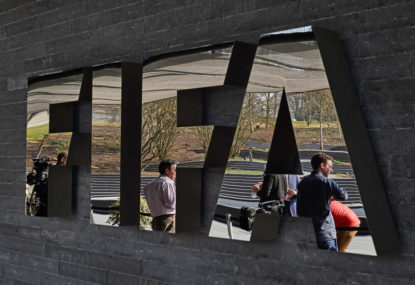Controversy as Villa keeper handed second yellow for shootout crowd taunting... but isn't sent off
Emi Martinez was saved by a new rule that resets yellow cards at the end of extra time, meaning his second yellow for taunting…

FIFA promotes the principle of football being above petty issues such as politics. Clearly they haven’t spent much time in Ukraine.
The conflict in Ukraine which erupted in 2014 in the wake of the Euromaidan protests and subsequent revolution has claimed many victims; football has not been exempt.
The Ukrainian Premier League was rocked by the Russian annexation of Crimea in 2014. Two of its Crimean clubs, FC Sevastapol and FC Tavriya Simferopol, were suddenly controlled by Russia. They played out the remainder of the season however at the end found themselves in a quandary.
Russian law now applied in Crimea and the clubs had to disband and re-register as Russian clubs. The Ukrainians appealed to UEFA and the end result was the clubs being unable to play in either Ukraine or Russia.
UEFA suddenly found itself in a difficult position as the regional conflict flowed into its comfortable office suites in Nyon. It arrived at a compromise.
A new Crimean league would be developed and administered by UEFA, with the clubs involved unable to participate in any UEFA sanctioned competitions. It was an unwieldy compromise however one that UEFA is likely to maintain until a political resolution to Crimea’s status is found.
Yet the Crimea was not the only fall-out from the unrest, the Donbass region in the East was ablaze.
Shaktar Donestk is one of the strongest clubs in Europe, yet the conflict cared little for its storied history. As Donestk Oblast was over-run with local insurgents with Russian support the Ukrainians fought back. Donestk, initially in the centre of the area of rebel control found itself on the front-line as the Ukrainians rapidly regained lost territory.
Shaktar’s home of Donbass Arena was damaged in the fighting and a decision was made to move the club’s operations to Kiev and its games to Lviv until the area was safe again for professional football.
With Donetsk in the heart of the conflict and many of its supporters on either side of the front line, Shaktar has had to be extremely diplomatic in its approach. The club took a decidedly anti-war position rather than seek to support either side, though moving the games to Lviv have hurt financially with attendances plummeting from an average of over 43,000 before the war to 13,000 last season.
Coupled with this corporate sponsors that supported the club also faced declining fortunes as a result of the conflict. Money was, and remains, scarce.
The burden of being forced away from their home proved too much for Shaktar’s local rivals, Metalurh Donetsk, who went bankrupt in 2015 though Olimpic Donetsk continue to survive operating out of Kiev.
A similar situation occurred in Luhansk, home to FC Zorya Luhansk and the focal point of the conflict in Luhansk Oblast. As with Shaktar, Zorya Luhansk had to move out of the conflict zone and as with Shaktar attendances and finances suffered as a result.
In all three of this season’s fourteen clubs in the Ukrainian Premier League are playing in neutral stadiums due to the security situation in the Donbass region and a further three Premier League clubs have ceased to exist as a direct consequence of the Donbass conflict and annexation of Crimea.
But what of those caught behind the lines?
It would appear that football is seen as a useful tool to legitimise the aspirations of the break-away regions. In August 2015 a representative side of the self-proclaimed “Donetsk People’s Republic” defeated the “Luhansk People’s Republic” 4:1 at Metalurh Donetsk’s old home ground. They then went on to the site of the frozen conflict in Georgia to lose 1:0 to Abkhazia.
But it isn’t all about politics.
Despite the challenges Shaktar Donetsk has maintained its academy and development facilities in Donetsk, offering an opportunity for youth caught in the conflict to pursue their dream of professional football. Zorya Luhansk have also continued to develop young players in Luhansk Oblast.
That there are people in this political quagmire that are truly focused on the good of the game is without question. That there are people who see football as an opportunity to promote their various versions of nationalism is equally true.
Ukraine remains a test case for both UEFA and FIFA and is a test they must not fail if the goal of deploticised football is to amount to anything other than, ironically, a political ploy.